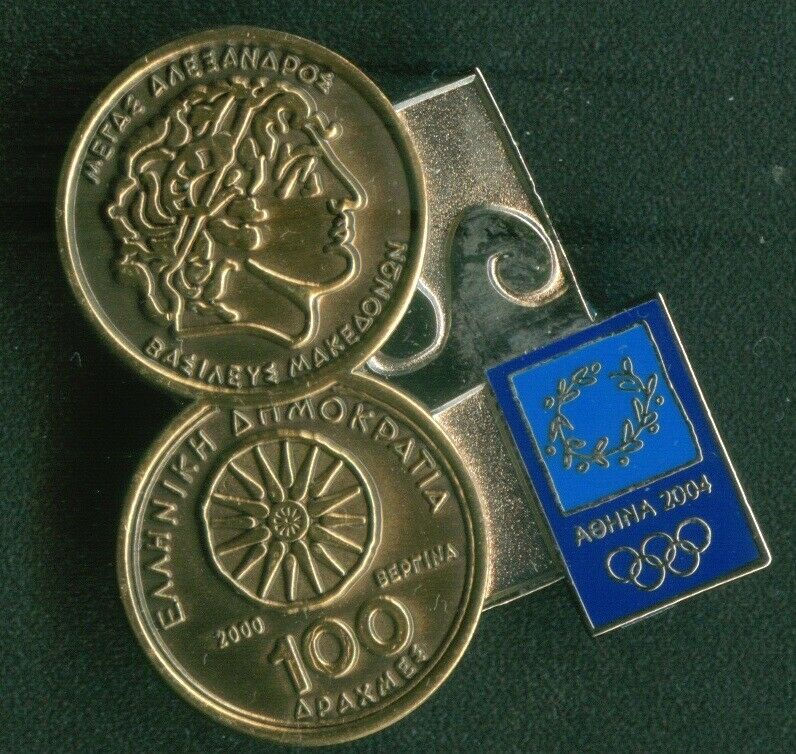-40%
ATHENS 2004 OLYMPIC GAMES. A SET OF 7 PINS DEPICTING GREEK DRACHMA COINS
$ 42.24
- Description
- Size Guide
Description
ATHENS 2004 OLYMPIC GAMES. A SET OF 7 PINS DEPICTING GREEK DRACHMA COINS1 DRACHMA COIN
depicts
Laskarina Bouboulin
a
(11 May 1771 – 22 May 1825) was a Greek naval commander, heroine of the Greek War of Independence in 1821, and an Admiral of the Imperial Russian Navy.
2 DRACHMA COIN
depicts
Manto Mavrogenous
(1796 - July 1848) was a Greek heroine of the Greek War of Independence. A rich woman, she spent all her fortune for the Hellenic cause. Under her encouragement, her European friends contributed money and guns to the revolution.
5 DRACHMA COIN
depicts
Aristotle
(384 BCE – 322 BCE) was a Greek philosopher born in Stagirus in 384 BCE. His father, Nicomachus, died when Aristotle was a child and he lived under a guardian's care. At the age of eighteen, he joined Plato’s Academy in Athens and remained until the age of thirty-seven, around 347 BCE. His writings cover many subjects, including physics, metaphysics, poetry, theater, music, logic, rhetoric, linguistics, politics, government, ethics, biology, and zoology. Aristotle's writings were the first to create a comprehensive system of Western philosophy, encompassing ethics, aesthetics, logic, science, politics, and metaphysics. Shortly after Plato died Aristotle left Athens. With the request of Philip of Macedonia he became a tutor for Alexander in 356-323 BCE.
10 DRACHMA COIN
depicts
Democritus
meaning "chosen of the people" (c. 460 – c. 370 BCE) was an Ancient Greek philosopher born in Abdera, Thrace, Greece. A pupil of Leucippus, he was an influential pre-Socratic philosopher who formulated an atomic theory for the universe. His exact contributions are difficult to disentangle from those of his mentor Leucippus, as they are often mentioned together in texts. Their speculation on atoms, taken from Leucippus, bears a passing and partial resemblance to the nineteenth-century understanding of atomic structure that has led some to regard Democritus as more of a scientist than other Greek philosophers; however, their ideas rested on very different bases. Largely ignored in ancient Athens, Democritus was nevertheless well known to his fellow northern-born philosopher Aristotle. Plato is said to have disliked him so much that he wished all his books burned. Many consider Democritus to be the "father of modern science".
20 DRACHMA COIN
depicts
Dionysios Solomos
; 8 April 1798 – 9 February 1857) was a Greek poet from Zakynthos. He is best known for writing the Hymn to Liberty, of which the first two stanzas, set to music by Nikolaos Mantzaros, became the Greek national anthem in 1865. He was the central figure of the Heptanese School of poetry, and is considered the national poet of Greece—not only because he wrote the national anthem, but also because he contributed to the preservation of earlier poetic tradition and highlighted its usefulness to modern literature. Other notable poems are ‘The Cretan’, ‘The Free Besieged’ and others. A characteristic of his work is that no poem except the Hymn to Liberty was completed, and almost nothing was published during his lifetime.
50 DRACHMA COIN
In the Western classical tradition,
Homer
is the author of the Iliad and the Odyssey, and is revered as the greatest of ancient Greek epic poets. These epics lie at the beginning of the Western canon of literature, and have had an enormous influence on the history of literature. When he lived is unknown. Herodotus estimates that Homer lived 400 years before his own time, which would place him at around 850 BC, while other ancient sources claim that he lived much nearer to the supposed time of the Trojan War, in the early 12th century BC. Most modern researchers place Homer in the 7th or 8th centuries BC. The formative influence of the Homeric epics in shaping Greek culture was widely recognized, and Homer was described as the teacher of Greece. Homer's works, which are about fifty percent speeches, provided models in persuasive speaking and writing that were emulated throughout the ancient and medieval Greek worlds. Fragments of Homer account for nearly half of all identifiable Greek literary papyrus finds.
20 DRACHMA COIN
depicts
Alexander III of Macedon (20/21 July 356 – 10/11 June 323 BC), commonly known as
Alexander the Great
was a king of Macedon, a state in northern ancient Greece. Born in Pella in 356 BC, Alexander was tutored by Aristotle until the age of 16. By the age of thirty, he had created one of the largest empires of the ancient world, stretching from the Ionian Sea to the Himalayas. He was undefeated in battle and is considered one of history's most successful commanders. His empire stretched from Greece to modern-day Pakistan.
PINS IN EXCELLENT CONDITION BUT IF PHOTO SHOWS OTHERWISE IT IS DUE TO MY BAD SCANNING
Seller will NOT bear any responsibility
on the loss of item if the package is not delivered via registered postage.
USPS priority mail
means registered shipping
with tracking number.
If you are not satisfied with the item, please contact me for return/resend/refund; before leaving any unfair feedback.
To my
NEW CUSTOMERS
in the
South America and Mexico
, shipping time seems to be
6-8 weeks
with Standard and priority shipping. If you are not happy to wait that length of time, please do not buy from us.


















